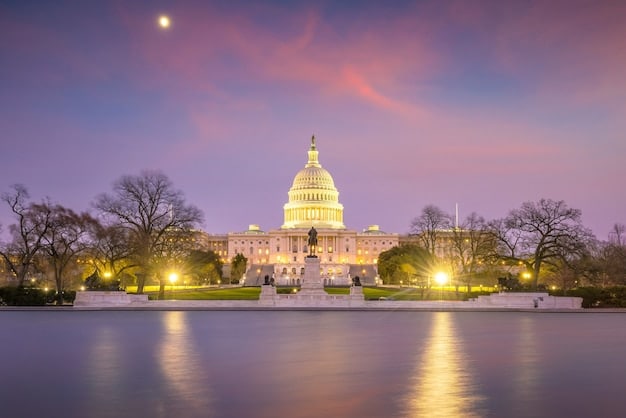Understanding New Lobbying Regulations & Corporate Influence in Washington

The new lobbying regulations in Washington aim to increase transparency and accountability, potentially curbing corporate influence by imposing stricter reporting requirements and limitations on campaign contributions.
Navigating the intricate web of Washington politics just became a bit more complex. This article delves into understanding the implications of the new lobbying regulations on corporate influence in Washington, exploring how these changes could reshape the landscape of political power and corporate strategy.
The Evolving Landscape of Lobbying in Washington
Lobbying has long been a cornerstone of political discourse in Washington, serving as a conduit between various interest groups and policymakers. However, the evolving landscape of lobbying, marked by increasing scrutiny and calls for reform, necessitates a closer examination of its implications.
Understanding the dynamics of lobbying is crucial for deciphering the intricacies of policy formation and corporate influence. This section explores the historical context, current trends, and potential future developments in the realm of lobbying.
Historical Context of Lobbying
The roots of lobbying in the United States can be traced back to the early days of the republic, when individuals would gather in the lobbies of legislative buildings to petition lawmakers. Over time, lobbying evolved from informal interactions to a sophisticated industry with dedicated professionals and substantial financial resources.
Current Trends in Lobbying
Today, lobbying encompasses a wide range of activities, including direct advocacy, grassroots mobilization, and public relations campaigns. The rise of digital technologies and social media has further transformed the way lobbying is conducted, enabling interest groups to reach broader audiences and exert greater influence.
- Increased Transparency: Calls for greater transparency in lobbying activities have led to stricter reporting requirements and disclosure regulations.
- Rise of Dark Money: The increasing role of “dark money” in political campaigns and lobbying efforts raises concerns about accountability and undue influence.
- Focus on Grassroots Mobilization: Interest groups are increasingly relying on grassroots mobilization and digital advocacy to amplify their voices and influence policymakers.
In conclusion, the landscape of lobbying in Washington is constantly evolving, shaped by historical context, current trends, and ongoing debates about transparency and accountability. As new regulations are implemented and technology continues to advance, the dynamics of lobbying will undoubtedly continue to shift, impacting the balance of power between corporations, policymakers, and the public.
Key Provisions of the New Lobbying Regulations
The introduction of new lobbying regulations in Washington marks a significant step towards reshaping the relationship between corporations and policymakers. These provisions aim to enhance transparency, accountability, and fairness in the political process.
Understanding the key provisions of these regulations is essential for assessing their potential impact on corporate influence and political decision-making. This section delves into the specific measures outlined in the new legislation, examining their scope, implications, and potential challenges.

Stricter Reporting Requirements
One of the central tenets of the new lobbying regulations is the imposition of stricter reporting requirements on lobbyists and their clients. These measures mandate more detailed disclosures of lobbying activities, expenditures, and contacts with government officials.
By requiring greater transparency, the regulations aim to shed light on the financial flows and communication channels that underpin lobbying efforts, enabling the public and policymakers to better understand the influence of special interests.
Limitations on Campaign Contributions
In addition to enhanced reporting requirements, the new regulations also introduce limitations on campaign contributions from lobbyists and corporations. These restrictions seek to curb the potential for quid pro quo exchanges between donors and elected officials.
- Prohibition of Bundling: The regulations prohibit lobbyists from bundling campaign contributions from multiple donors, a practice that has been criticized for amplifying the influence of special interests.
- Restrictions on Corporate Donations: The new rules place limits on the amount of money corporations can donate to political campaigns and parties.
- Disclosure of Political Spending: The regulations mandate the disclosure of corporate spending on political advertising and other election-related activities.
In summary, the key provisions of the new lobbying regulations encompass stricter reporting requirements and limitations on campaign contributions, reflecting a broader effort to promote transparency, accountability, and fairness in the political arena. These measures, if effectively enforced, could have far-reaching implications for corporate influence and the integrity of the democratic process.
Impact on Corporate Lobbying Strategies
The implementation of new lobbying regulations in Washington is poised to significantly impact corporate lobbying strategies. Corporations must adapt their approaches to comply with the new rules and maintain effective engagement with policymakers.
This section explores how the new regulations are likely to reshape corporate lobbying activities, examining the challenges and opportunities that arise from these changes.
Shifting from Direct Lobbying to Grassroots Advocacy
One potential consequence of the new regulations is a shift in corporate lobbying strategies from direct engagement with policymakers to grassroots advocacy and public relations campaigns. As direct lobbying becomes more regulated and scrutinized, corporations may seek to influence public opinion and mobilize support for their policy positions.
Increased Focus on Compliance and Ethics
The stricter reporting requirements and limitations on campaign contributions necessitate a greater focus on compliance and ethics within corporate lobbying operations. Companies must ensure that their activities adhere to the new regulations and that their lobbyists are trained on ethical conduct.

- Enhanced Due Diligence: Corporations must conduct thorough due diligence on their lobbyists and consultants to ensure compliance with lobbying regulations.
- Development of Ethics Codes: Companies may need to develop or update their ethics codes to reflect the new standards of conduct for lobbyists.
- Training Programs: Lobbyists and corporate employees involved in lobbying activities should receive training on the new regulations and ethical guidelines.
In conclusion, the new lobbying regulations are poised to reshape corporate lobbying strategies, prompting companies to shift from direct lobbying to grassroots advocacy, increase their focus on compliance and ethics, and adapt their approaches to navigate the evolving political landscape. By embracing transparency, accountability, and ethical conduct, corporations can maintain effective engagement with policymakers while upholding the integrity of the democratic process.
Potential Challenges and Loopholes
Despite the laudable goals of the new lobbying regulations, potential challenges and loopholes could undermine their effectiveness. It is crucial to identify these vulnerabilities and address them proactively to ensure that the regulations achieve their intended objectives.
This section explores some of the potential challenges and loopholes that could hinder the implementation and enforcement of the new regulations, examining the risks and proposing solutions to mitigate them.
Enforcement Capacity and Resources
One potential challenge is the limited enforcement capacity and resources of regulatory agencies responsible for overseeing lobbying activities. Without adequate funding and personnel, these agencies may struggle to effectively monitor compliance, investigate violations, and enforce penalties.
Defining and Regulating Shadow Lobbying
Another challenge lies in defining and regulating “shadow lobbying,” which refers to activities that resemble lobbying but fall outside the scope of existing regulations. This can include indirect advocacy, public relations campaigns, and grassroots mobilization efforts that are intended to influence policymakers but are not formally registered as lobbying activities.
Identifying and closing these loopholes is essential for preventing corporations and special interests from circumventing the regulations and exerting undue influence on political decision-making.
- Clarification of Definitions: Regulatory agencies should clarify the definitions of lobbying activities to ensure that all forms of influence are captured.
- Expansion of Disclosure Requirements: Disclosure requirements should be expanded to cover a wider range of activities, including grassroots advocacy and public relations campaigns.
- Enhanced Oversight of Third-Party Groups: Regulatory agencies should enhance their oversight of third-party groups that engage in lobbying activities on behalf of corporations and special interests.
In summary, addressing potential challenges and loopholes is essential for ensuring the effectiveness of the new lobbying regulations. By strengthening enforcement capacity, closing regulatory gaps, and promoting transparency and accountability, policymakers can create a more level playing field and safeguard the integrity of the democratic process.
Expert Opinions and Perspectives
To gain a comprehensive understanding of the implications of the new lobbying regulations, it is essential to consider the opinions and perspectives of various experts and stakeholders. These insights can provide valuable context and shed light on the potential impacts of the regulations.
This section presents a range of expert opinions and perspectives on the new lobbying regulations, examining their strengths, weaknesses, and potential consequences.
Academic Analysis of Lobbying Regulations
Academics who study lobbying and political influence offer scholarly analysis of the new regulations, examining their theoretical underpinnings, empirical evidence, and potential policy implications.
Lobbyists’ Views on the New Rules
Lobbyists themselves have diverse views on the new regulations, ranging from cautious support to outright opposition. Some lobbyists acknowledge the need for greater transparency and accountability, while others express concerns about the potential impact on their ability to represent their clients effectively.
Experts emphasize the importance of ongoing evaluation and adjustment to ensure that the regulations achieve their intended goals without unintended consequences.
- Focus on Measurable Outcomes: Policymakers should focus on measurable outcomes, such as changes in lobbying expenditures and patterns of influence.
- Feedback Mechanisms: Establishing feedback mechanisms for stakeholders, including lobbyists, corporations, and advocacy groups, can provide valuable insights into the regulations’ effectiveness.
In conclusion, incorporating expert opinions and perspectives is essential for a nuanced understanding of the implications of the new lobbying regulations. By considering a range of viewpoints and engaging in evidence-based analysis, policymakers can refine the regulations and maximize their effectiveness in promoting transparency, accountability, and fairness in the political arena.
The Future of Corporate Influence in Washington
The implementation of new lobbying regulations raises fundamental questions about the future of corporate influence in Washington. Will these regulations effectively curb the power of special interests, or will corporations find new ways to exert their influence?
This section explores potential scenarios for the future of corporate influence in Washington, considering the interplay between regulatory changes, technological advancements, and evolving political dynamics.
Technological Innovations and Digital Advocacy
Technological innovations, such as artificial intelligence and data analytics, could play an increasingly prominent role in lobbying and advocacy efforts. Corporations may leverage these technologies to target specific audiences, personalize their messages, and mobilize support for their policy positions.
To ensure a level playing field and prevent undue influence, policymakers must adapt their approaches to address these emerging challenges.
- Regulation of Digital Advertising: Policymakers may need to regulate digital advertising and online lobbying to ensure transparency and prevent deceptive practices.
- Promotion of Media Literacy: Promoting media literacy and critical thinking skills can help citizens discern between credible information and manipulative propaganda.
In summary, the future of corporate influence in Washington is uncertain, but it is clear that regulatory changes and technological advancements will continue to shape the dynamics of political power. By anticipating these changes, addressing potential loopholes, and promoting transparency and accountability, policymakers can ensure that the pursuit of corporate interests does not undermine the integrity of the democratic process.
Key Takeaways
| Key Point | Brief Description |
|---|---|
| ✍️ Stricter Reporting | More detailed disclosures of lobbying activities and expenditures. |
| 💰 Limits on Contributions | Restrictions on campaign donations from lobbyists and corporations. |
| 📣 Grassroots Advocacy | Potential shift from direct lobbying to public relations and mobilization. |
| 🤖 Tech & Lobbying | Use of AI and data analytics to target audiences and personalize messages. |
Frequently Asked Questions
▼
The primary goals are to enhance transparency by requiring detailed reporting and limit corporate influence by restricting campaign contributions to promote fairness in Washington.
▼
The new regulations place restrictions on how much lobbyists and corporations can donate, aiming to reduce the potential for quid pro quo exchanges with elected officials.
▼
Shadow lobbying refers to activities outside formal lobbying definitions, potentially undermining the effect of the regulations if loopholes aren’t addressed to prevent undue influence.
▼
▼
AI could be used to target audiences, personalize messages, and mobilize support, potentially changing how corporations influence policy and engage in advocacy efforts.
Conclusion
In conclusion, understanding the implications of the new lobbying regulations on corporate influence in Washington is a critical step towards fostering a more transparent and equitable political landscape. As corporations adapt their strategies and policymakers address potential loopholes, the future of lobbying will undoubtedly continue to evolve.





